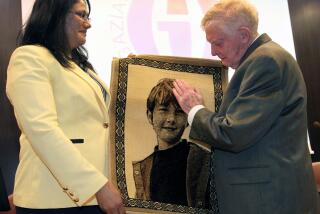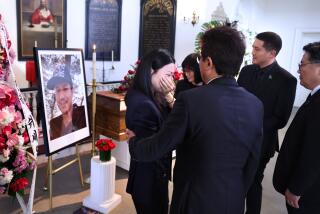Mentally ill man dies lonely death
Late Saturday night, a passerby noticed Troy Green’s body lying on the sidewalk at the intersection of Parmelee Avenue and 75th Street in Florence. The 23-year-old had been shot, and had died alone, on the pavement.
A few hours later, in St. Petersburg, Fla., a police officer went to the home of Green’s sister Lillian. The officer got out only two words -- “your brother” -- and she broke down and cried.
She didn’t need to hear more, because for three long years Lillian Green had been expecting news of this sort about her troubled younger brother. Troy Green suffered delusions, talked to himself and behaved erratically, she said. Despite all her efforts to get him off the street, bathe him, feed him and get him into a treatment program, Lillian Green hadn’t been able to stop the spiral that ended with his killing.
Across the country, Los Angeles County sheriff’s homicide Det. Robert Harris was also not surprised when he learned the details of his newest case. He said he has seen similar cases again and again: mentally ill people, adrift in gang-populated neighborhoods, falling victim to homicide.
As a young black man who had wandered far from home, Green was already, statistically, in considerable danger hanging out on the streets of Florence. But his mental illness -- his sister believes it was paranoid schizophrenia, though he was never diagnosed -- may have made him even more vulnerable.
Harris said mentally ill people are often killed because they have inadvertently antagonized assailants. And in gang neighborhoods, where understanding social cues and threats are key to survival, the results can be deadly.
“People take their behavior as an affront, or a lack of respect, or a challenge,” Harris said of the mentally ill homicide victims.
Now, Lillian Green, a nursing student and mother of three, condemns a system that she said left her with few options to keep her brother safe.
“I promised my mother I would always take care of my brother,” she said. “On her dying bed, her last words were, ‘Lillian, take your brother wherever you go.’ Imagine how I feel now.”
Troy and Lillian Green grew up in Florida, the children of a single mother who died of lupus when her son was 12, leaving them to be raised by a grandparent, Lillian Green said. As a child, she said, Troy “was the sweetest thing ever. If he had a dollar, and I spent mine, he gave me his.” The two were just 11 months apart.
But very early in his life, Troy Green also displayed signs of trouble. At school, he was diagnosed with some kind of learning or behavioral disability.
As an adolescent, he was in and out of prison for crimes related to fighting, drugs and traffic offenses, she said. But he was still together enough to have a girlfriend and a daughter, Paris, now 4.
It was when he turned 20 that Troy Green’s problems seemed to become severe.
One day Lillian Green noticed him talking to himself. It got worse. “He would be laughing with no one around. I would say, ‘What are you laughing at?’ and he would say, ‘I’m not laughing.’ ”
He paced back and forth across the same few yards of space, chuckling and chattering. He began living on the streets. Once, Lillian Green discovered him living in a nearby abandoned house. She was horrified to find that he had fixed up the interior to look like a funeral home, with flowers and a homemade casket.
Soon, she could not get him to come home at all. She could always find him on the same corner, where he stood all day.
He refused to see a psychiatrist. Increasingly desperate, Lillian Green would call the police and beg them to take her brother to a hospital. They couldn’t, they said. He was an adult, and not doing harm to himself or others, they told her.
Then Troy Green took a Greyhound bus west with a woman he had just met.
For a few weeks, Lillian Green didn’t hear from him. Finally, he called a relative. He was at a pay phone, somewhere in Los Angeles. He was alone, stranded and hungry, he said. He left a number. But the number didn’t work. And no one could tell Lillian Green where the pay phone was.
She called police in Florida and in Los Angeles. She tried to fly to L.A. but she was eight months pregnant, and the airline wouldn’t allow her on the plane.
An uncle traveled from Las Vegas to L.A., located Troy Green and brought him to the Greyhound bus station in Los Angeles. Troy called his sister, and told her he was coming home. The uncle waited until the bus pulled away.
He never got to Florida.
Apparently, he got off at one of the first bus stops, somewhere near Compton, and went back to living on the streets.
Harris, the detective, said it’s not clear exactly why a Latino man on foot shot him several times at about 9:15 p.m. April 26, then fled. A black gang and a Latino gang have been fighting in the area for years, and Troy Green could have been mistaken for a member of the black gang, he said. Or he could have angered someone, challenged them, or given the wrong answer, Harris said.
Lillian Green said she understands involuntary commitment laws. But, she says, “It shouldn’t be that way. It should be based on whether they need help,” she said.
“I keep thinking about how he felt out there with nobody, all alone, with no family,” she said.
Sheriff’s detectives are seeking information from the public on this case. They can be reached at (323) 890-5500.
--
More to Read
Sign up for Essential California
The most important California stories and recommendations in your inbox every morning.
You may occasionally receive promotional content from the Los Angeles Times.










